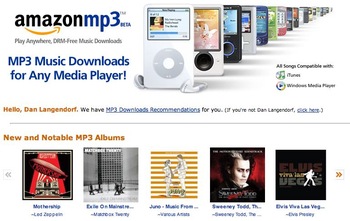 With the death of copyright-protected digital music imminent, several questions come to mind. Chief among them: What’s next for iTunes? And does anybody want to pay for music anymore?
With the death of copyright-protected digital music imminent, several questions come to mind. Chief among them: What’s next for iTunes? And does anybody want to pay for music anymore?
As last100 reported earlier today (via BusinessWeek), Sony BMG is set to become the last of the four major record labels to at least, in part, scrap digital rights management, or DRM. Sony BMG now joins rivals EMI, Universal Music Group, and Warner in offering some of their catalogue DRM-free, meaning consumers can play the purchased music on any MP3-enabled device.
Already the Web is cheering: Ding Dong the Music DRM Witch is Dead! And RIP DRM. But, truth be told, DRM ain’t dead yet. Sony BMG and UMG are in an experimental stage, with results to be reviewed.
Even though DRM isn’t completely dead, the prediction of its demise in 2008 is still a good one. It’s coming. The questions are when and in what form.
 When will Sony BMG, UMG, Warner, and EMI sell all of their music DRM-free, no strings attached?
When will Sony BMG, UMG, Warner, and EMI sell all of their music DRM-free, no strings attached?
Will they make their catalogues available for sale through any Website that wants to sell it — AmazonMP3, iTunes, eMusic, 7Digital, even Facebook and MySpace?
Will the labels make their music available for purchase through mobile carriers?
By giving AmazonMP3 the leg up on DRM-free sales, Sony BMG, UMG, Warner, and EMI (the only one to sell DRM-free on iTunes) are trying to wrest power away from Apple and CEO Steve Jobs when it comes to digital music distribution and pricing.
iTunes is believed to have as much as 80 percent of the digital download market. BusinessWeek says the labels “unwittingly” gave much of the power over music distribution to Apple when legal digital downloading was in its infancy. Since then, Apple has stuck by its guns: fixed pricing (99 cents per track) and unbundled albums (songs offered as an album can also be purchased a la carte).
The labels have wanted flexible pricing and the option to sell bundled albums for the past two years. Which leads to more questions.
Almost a year ago, Jobs published a letter — “Thoughts on Music” — in which he pressured the record labels to abandon their use of copyright protection. “In such a world, any player can play music purchased from any store, and any store can sell music which is playable on all players,” Jobs wrote. “This is clearly the best alternative for consumers, and Apple would embrace it in a heartbeat.”
 In light of the major labels offering DRM-free music through AmazonMP3, where does this leave iTunes?
In light of the major labels offering DRM-free music through AmazonMP3, where does this leave iTunes?
Will Apple give up its FairPlay DRM when it comes to music? Will all songs and albums be sold on iTunes without digital rights management in the near future?
To stay competitive with AmazonMP3, does Jobs need to give in and allow flexible pricing? Will Jobs relent and sell bunded albums on iTunes? In doing so, will Sony BMG, UMG, and Warner start selling DRM-free music on iTunes?
Or is iTunes’ market share, brand name, and shopping experience so strong, and its customers so loyal, that Apple can sit tight and not worry?
For that matter, does selling music online matter anymore?
Music sales continue to plummet, digital sales are rising, but even so recent experiments (Radiohead and Trent Reznor’s Saul William project) suggest that, while some people are willing to pay for music, a majority are not. As ReadWriteWeb’s Marshall Kirkpatrick asks, “Is it time to declare music downloads a loss leader?”
Another worthy question.

DRM free music being sold elsewhere will play on iPods, which leaves Apple free to REALLY piss off the record companies by starting a record company.
An iTunes based record company would cut out the middle man record companies and immediately have a huge audience and brand recognition.
@ Robert
I’m not sure Apple will ever start a record label, for several reasons.
1) It may conflict with their trademark since the Beatles-owned label Apple records still exists. They’ve already clashed in court with Apple, although some agreement was recently met – not sure if that gives way to Apple using the name more freely in a music-associated business or not.
2) It would antagonize the four majors to such a degree that the iTunes Store could become a graveyard aside from Apple’s own content acquisitions.
3) Do artists really need a new label, even one as “cool” as Apple? A trend maybe to go-it-alone ala Radiohead. In which case, iTunes just needs to become more favorable to “indie” artists (with better terms).
Steve, you make some valid points, I’ll give you that. On the other hand, who would have thought that Starbucks, a coffee company, would launch a record label? Stranger things have happened is all I’m saying 🙂